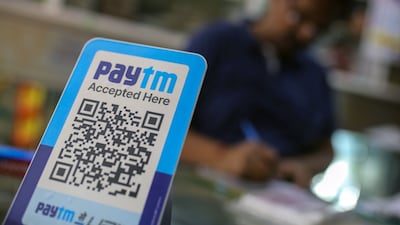Indian digital payments firm Paytm lost a fifth of its market value on Thursday after the central bank ordered its payment bank subsidiary to halt its business, sparking fears for the company's profitability and reputation.
Paytm's stock fell to a six-week low of 609 rupees ($7.34), erasing around $1.2 billion in value from the company also known as One 97 Communications. The stock was down 20 per cent, at the bottom of its exchange-imposed daily trading band.
The Reserve Bank of India on Wednesday ordered Paytm Payments Bank to stop accepting fresh deposits in its accounts or digital wallets from March, raising worries over revenues from the company's main payments business.
That could be a precursor to cancelling the bank's licence, a person familiar with the matter told Reuters.
Paytm and the RBI did not immediately respond to requests for comment.
The RBI's action raises concern that Paytm's lending partners might reconsider their relationships with the company, which owns 49 per cent of the payments bank, analysts said.
It could stall efforts by Paytm, which rose to fame after India banned high-denomination notes in 2016, to attain profitability on a net basis.
The stock remains at a fraction of its 2021 listing price despite having climbed 20 per cent last year and a further 20 per cent this month before the central bank's action.
Paytm said it would take steps immediately to comply with the RBI's directions, and that it expects a worst-case impact of 3 billion to 5 billion rupees to its annual earnings before interest, tax, depreciation and amortisation.
In 2022 the RBI ordered the bank to stop adding customers. A subsequent audit revealed “persistent non-compliances and continued material supervisory concerns in the bank”, the central bank said on Wednesday, without disclosing details.
Jefferies downgraded Paytm's stock to “underperform” from “buy” after the RBI move, slashing its target price to 500 rupees from 1,050 rupees and saying regulatory and reputational issues could affect profitability.
The brokerage cut its ebitda estimates, excluding the employee stock ownership plan, for Paytm by 46 per cent in the 2025 financial year and 44 per cent for 2026, forecasting a 7 per cent to 10 per cent fall in payments revenues, a 17 per cent to 24 per cent drop in lending revenues, and compression in payments margins.

“Paytm's business impact will largely come from reputational concerns arising from governance/compliance and hence, the path to resolution will be from stronger compliance with regulations and revoking of RBI measures,” Jefferies said.
The RBI will also terminate the nodal accounts, used to facilitate transactions of Paytm and Paytm Payments Services by February 29. Paytm Payments Services is a wholly owned subsidiary of Paytm.
“While we don't believe that the order is an end of the road for Paytm, it materially impacts near term growth and profitability,” JPMorgan analysts wrote in a note.
JPMorgan cut Paytm's rating to “underweight” from “neutral” and slashed the target price to 600 rupees from 900 rupees.
One 97 is one of India's largest payment firms and counts SoftBank and Ant Financial among its early investors.
Over the past year, SoftBank has reduced its Paytm stake, while Warren Buffett's Berkshire Hathaway and China's Alibaba Group have exited the company.
Paytm Payments Bank chief executive Vijay Shekhar Sharma holds 51 per cent of the bank that Paytm does not own, according to the company's annual report for 2022-2023. The bank received its licence in 2015.

